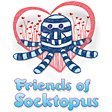PBS and the preschool body politic
 Monday, April 15, 2013 at 1:39PM
Monday, April 15, 2013 at 1:39PM Today, while I stood in the kitchen making lunch with a baby at my feet rummaging through the drawer of breast pump parts and old sippy cups, George was -- I thought -- watching Daniel Tiger's Neighborhood. He came tearing in from the living room in a panic.
"Mama! Mama! Fun is being eliminated on PBS!" he said, stricken. I'd seen the requests for sponsorship a million times, heard the warning that government funding may be eliminated, so the onus was on us, the public, to keep the P in PBS.
"Not fun; fun-ding," I said. "That means the money that pays for the channel to run might go away."
"They have an empty bank account?" He asked. Uh... No idea where he might've heard that before. Ahem.
What began as a funny mishearing ended up as a civics lesson of sorts. Over lunch, we talked about the cost of doing business as a tv station, and the difference between the shows on PBS and other channels. I asked him if people should pitch in to keep PBS on the air, and he nodded his head enthusiastically. "Yes, because those shows teach me about going potty and they teach Zelda about colors!"
"But what about the people who don't watch the shows? The people who already know colors and how to go potty?" I asked.
"Well, they like Rick Steves!" he said. Unsure about how to delve into even generalities of socialism with a three year old, I assured him that not everyone likes Rick Steves (we had to agree to disagree on that one), just like not everyone plays with the matchbox cars at his school despite their availability to everyone. What he came up with didn't surprise me, exactly, because I believe that this is the simplest, fairest strategy for most everything: "But," George said, chewing his peanut butter and honey sandwich thoughtfully, "if I have a pee accident at Fred Meyer it gets the cart yucky (hypothetical, right, dude?). Zelda needs to know her colors so she can stop at the red light when she's a grown up kid. Daniel Tiger helps everyone even if you're doing something else at 11:00." Helping the least of us is not a concept foreign to kids. When do we stop helping our friends put on their boots so we can go outside together, and start telling them to hoist themselves up by those bootstraps and quit complaining that we've left them behind? Being helpful is most toddlers' fondest wish; socialism just follows.
Back to George: Cupcake Wars? Mickey Mouse Clubhouse - two of his other favorites? I pointed out that they stop for commercials, something he dislikes for their rapid pace and often unnerving content (ask him sometime how he feels about Anne Burrell). It wasn't hard for him to grasp the difference between money-making breaks and those designed to pause and reaffirm what you just learned. We talked about getting money from individuals and families rather than big companies. We compared it to the bus and the library, two other things he loves that require both government funding and the buy in of people who use them.
After lunch, he asked to look in his "bank account," a little red locking bank that opens only at five dollar increments. "How much do I have?" he asked. $6.05, I told him, pointing to each number. "You can open it when you get three more dollars and 95 cents."
"Can I give it to Daniel Tiger?" He looked at me hopefully.
"Of course! You can do whatever you want with your money."
"...Can I have three dollars?" Of course, I told him yes. But I also told him we'd be writing a letter to our representatives about how much we value PBS.
 charitable giving,
charitable giving,  government,
government,  pbs,
pbs,  preschoolers,
preschoolers,  socialism,
socialism,  spring fall pledge drive,
spring fall pledge drive,  toddlers,
toddlers,  tv in
tv in  family
family 



